Y Combinator 2017 Startup School: “Why?” (Part One)

- Welcome. This is CS183F, thank you for coming, we hope it will be a very good course. We are going to try to teach you what you need in the first 100 days of a startup, in fact, we will teach you how to move from a raw idea to a company.
I am the head of Y Combinator, Sam Altman, I have been teaching these people for a long time and I hope we can explain everything in an accessible way. Today, besides me, Dustin Moskowitz will speak as a guest speaker.
')
Dustin is one of the founders of Facebook and CTO and the developer of MVP. He is now co-founder and CEO of Asana. Dustin speaks first on behalf of this course, and I speak to other people more often about his speech. It is about why starting a startup and this is actually a very important question that people do not think enough about. He kindly agreed to come back and tell about it again.

- If you are here today or watch the video later, it means that you are probably planning to create a company. Therefore you are taking this course. Most of the course will be about how to do this and achieve success. But before we dive into how to become an entrepreneur, I'm here to help you understand why .
It is important to know what reason you have to make the right decision. I heard about various common motivations of potential entrepreneurs. But I found out that after they had fully considered the compromise, they often come to the conclusion that creating a company is not the best way to achieve their goals. I hope you will be sure that you are choosing the best solution. And I will also explain the reason why I like most of all to listen to people explaining why they decided to create a company, and what I hear when I think that someone is really ready for success.
I had already spoken with this speech before, as Sam said, and many people approached me afterwards and said that this helped them a lot in their decision making. In some cases, they decided that they should not create a company, they should actually join an existing company. But I know that many of you are determined. If so, then no problem. I think it will still be useful for you, as you will better understand what you have to go through.
This is not a long speech, I have about 10 slides and I left some time for questions at the end. Fine. And so, we will call things by their names.
Many people become entrepreneurs themselves in order to become very rich. They see themselves creating a new Facebook or Google. However, the chances of becoming so successful are in fact extremely small. Only a small fraction of entire generations of companies ultimately reach such heights.
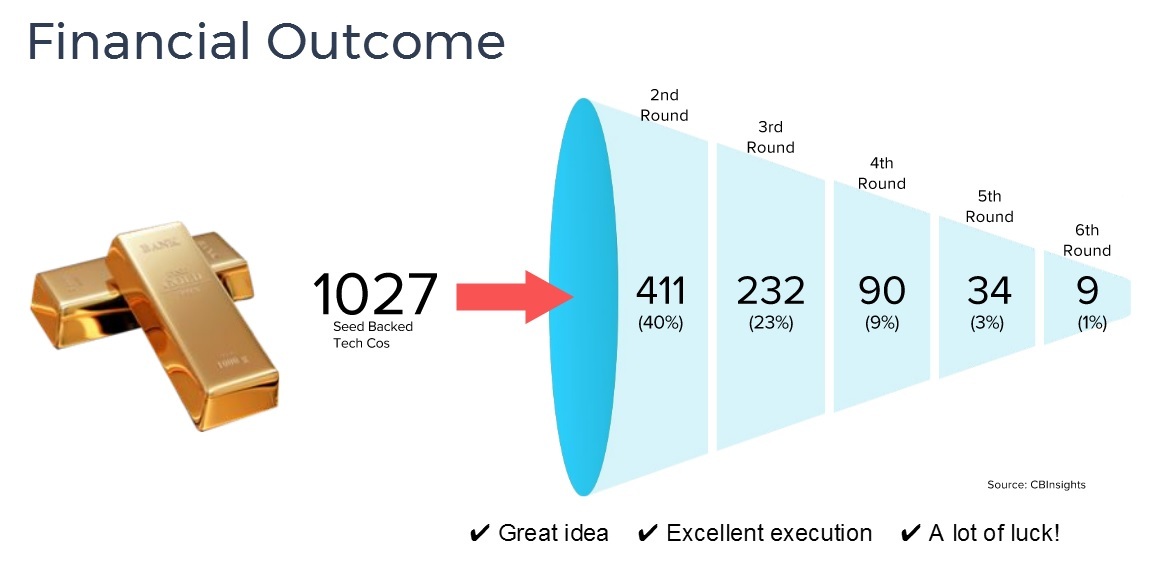
Here is a funnel from the CBN site. It shows the initial numbers of how much funded tech companies receive each round of funding. So even if we moderate our ambitions to the desire to become unicorns and will be a company valued at a billion dollars, we still have incredibly unequal chances.
Only 1% of funded companies go through the funnel. Passing six turns of the funnel is not quite the same thing as becoming a unicorn, but quite correlated. Most unicorns I know must go through at least such a large number of rounds of funding. To achieve this, you need to have a really great idea. It must be unique, justified, conquering a large market. You have to do it extremely well, which means that you have to work hard, you have to attract the right people and you must have a better strategy than your competitors. And you also need to be very, very lucky, because a lot of things can get in your way, and you can't control much of it.
I spoke with many investors and entrepreneurs and it seems that each time it is much more difficult to pass through the funnel. Not only more and more people create companies and competition, respectively, more, but it becomes more expensive to work for many reasons, especially here in the bay area. And investors also have higher expectations. You have seen that valuation ratios are starting to decline, especially in the open market. Perhaps most importantly, it becomes more difficult to interfere with officials. They are not the slow-moving giants they were 10 or 20 years ago. They know how to take advantage of their position in the market. Some of you think it’s difficult, of course, but you get a lot more money as a founder and obviously this is the only way to make a lot of money.
Let's talk about two great ways that can lead you to a wonderful salary.

First story: you are the founder, you have created a company that organizes Uber for pets. In the picture is a client, not a founder. This is a great idea and you have done it well, so at some point you are selling a company for $ 100 million. If you have a really successful marginal decrease in the shareholding of shareholders in the distribution of net income, your capital will be 10% of the company by the time it becomes liquid. So you get 10 million dollars. Pretty nice income.
However, I showed only a small part of the initial set, which allowed me to go so far, so this is a good case. $ 100 million is a bit easier than $ 1 billion, but it still rarely happens. Most likely you will be left with nothing on this path, because you will close the company for any reason. And often you see a company sold to a buyer with an estimate of such a range. And in many cases, the founder is still left with nothing because of the preference of investor liquidity. So a lot depends on how much money you got to get to this. This is definitely a very risky way.
Another way to earn about the same amount of money is to join a company at a later stage and help them rise from an estimated 500 million to, say, 20 billion. Even being straight out of college, you can achieve a lot financially by joining a company at this stage. But, especially if you have several years of experience, you will get very good options and you will also have a high salary.
I posted five main points here, so if you joined earlier, there may be more, if you have more experience, there may be more, but this is a kind of good standard. And you probably know that the market for experienced technicians is incredibly competitive, especially for product roles. If you make the right choice, you can also get away with 10 million dollars on this track. And if you make the right choice and find the next Facebook or Google while it is still not a unicorn, then you can achieve a lot.
The hundredth Facebook developer has a much better salary than most entrepreneurs. Of course, it is possible that you will choose the wrong company, do not grow to such a salary. This is, by the way, 40x tall, which is impressive. But the bottom line is that you must join the company much later than its development cycle. You will have more information. You can see performance, meet someone from the team, understand the competitive environment. And even if you do not find a company that grows to such heights, you have a good chance to choose the one that will grow to some decent level. In fact, your valuation of your capital is probably no longer zero. Therefore, you have excellent chances to get a good result in this case and it is possible to get a very good income.
Finally, if you founded the company, you have a long-term contract. Chances are good that you will spend ten years or more to raise it to the desired level and, in the end, you can still fail. If you join an existing company, you can work there for a couple of years to see if it has any growth prospects. If not, you can easily leave and try again. In fact, you can work for several different companies in a decade, and this greatly increases your chances of a home run.
The final conclusion is that there are many ways to get an excellent financial result, but the risk is much less if you join an existing company. Don't worry, not everything here will be an argument about why you should join an existing company.
Similarly, many people want to create a company to have a global impact on the world. Usually, the financial result correlates with this, so most of the arguments I have already cited apply here as well. But when you join an existing company, you have a number of great advantages. You get access to their existing database. It can be hundreds of billions, sometimes billions of people. You have the opportunity to work on top of the infrastructure that has already been built and measured and you are working with an existing team. And they will help you succeed.
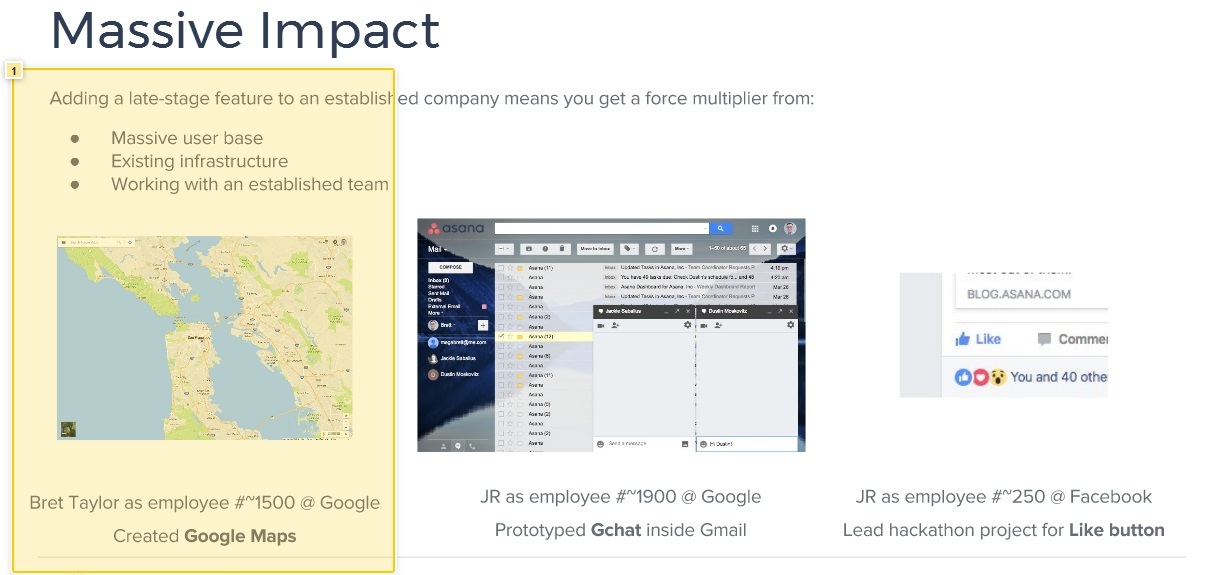
I want to give specific examples of global influence on the world that people received as employees. Bret Taylor, was the head of Quip before becoming an entrepreneur, after he joined Google, who at that time already had over 1000 employees. Nevertheless, he initiated the creation of Google Maps, which is used by hundreds of millions of people, including me on the way here today.
Similarly, my co-founder of Asana, Justin Rosenstein, joined Google at about the same time and made a prototype of the G-chat inside Gmail. It was more than 10 years ago, but it is still used by a mass of people. And soon after that, he went to Facebook, he had several hundred employees, and he led the Hackathon project, thanks to which the Like button was invented. Some of you probably used it once or twice.
And so, you can still join teams like Facebook and Google today and work on something that can attract literally a billion people.
If you want to become an entrepreneur and maximize global influence, these are the stories with which you should compare your capabilities. Next comes the lifestyle. Everyone has their own story about what it means to be a businessman.
In general, the media likes to make it glamorous, emphasizing product launches and financing steps. They prefer to talk about successful cases and ignore failures. And businessmen themselves are like ducks. They are calm in appearance, but in reality they are shaking like damned. But you can only see what is on the surface, entrepreneurs looking passionate and focused.
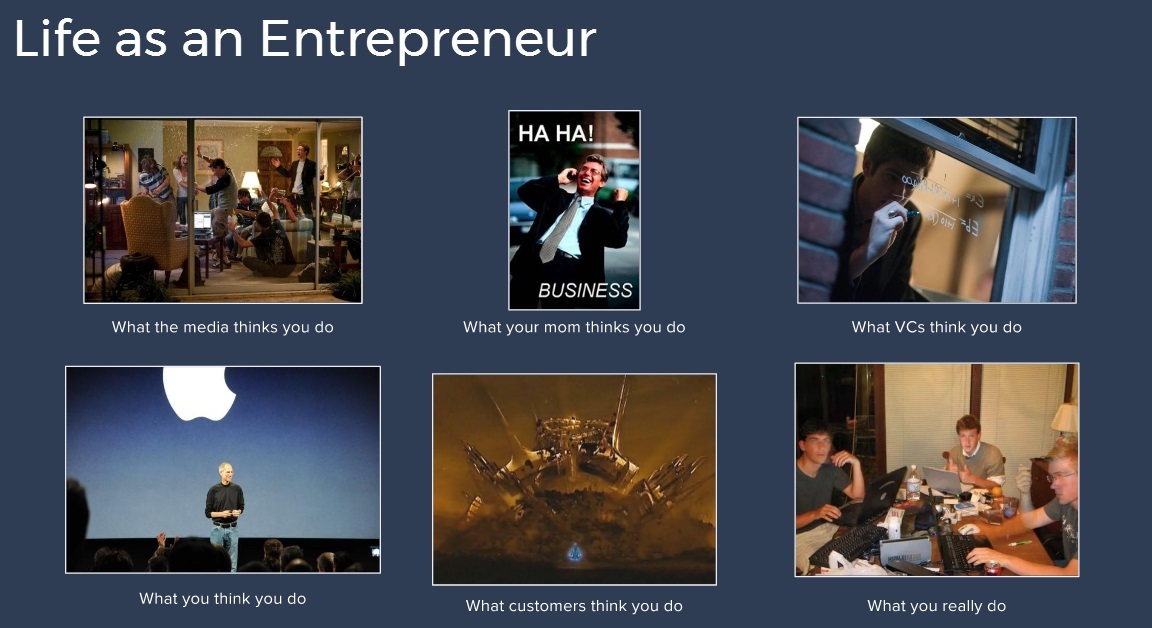
The first image here from Social Network is a feature film about creating Facebook. It looks funny. And the last photo is a real Facebook creation photo. They are a little different. Reality is a lot of moments with your head down during hard work. We barely have time to open the champagne and spray our laptops with them. And so, in practice, the technology is not exactly the same as in the "Social Network", rather as in the "Silicon Valley". Everything is actually very stressful. Why is that? For many reasons.
First, your team relies on you. You put their best years on the story you told them. And employers constantly ping them for a week. You always worry that you will lose them. Each round of fundraising feels like you are on the verge of life and death and your competitors are actually trying to kill you. And you are always like a stretched string, because it is hard to find time for a company, for other significant things, for your family and for yourself.
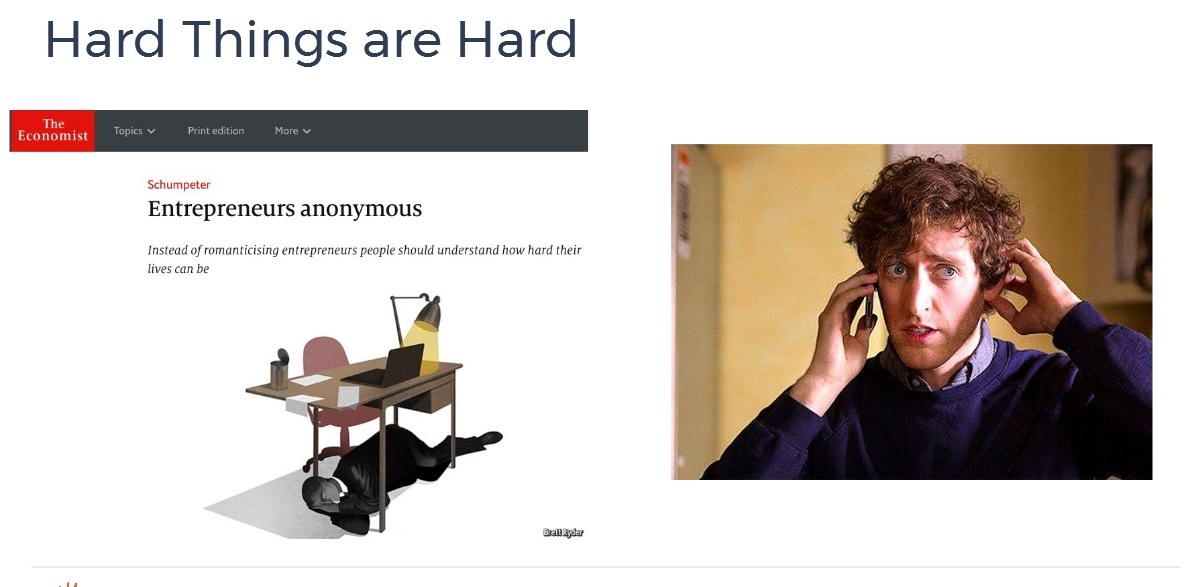
The title of the slide here is, of course, a reference to Ben Horowitz’s book "It Will Not Be Easy." If you want to delve into the subject, I definitely recommend reading this. People also think that as a founder you can control how you spend your time.
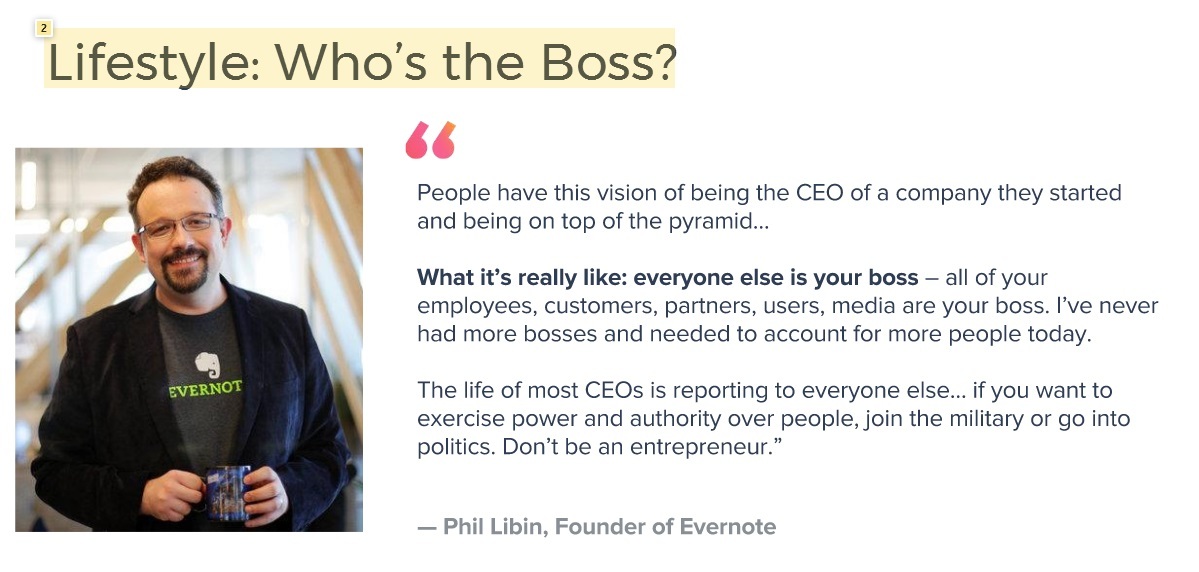
"People imagine the chief executive officers of the company at the top of the pyramid ...
How it really is: everyone else is your boss - all your employees, customers, partners, users, the media. They are your leaders. I have never had more managers than now and I have never had to report to so many people.
The life of most CEOs is to report to everyone else ... If you want to feel universal acceptance and power over people, go to the military or politics. Do not become entrepreneurs. ”
This is a great quote by Phil Libin, it takes a second to read it. Phil and I found out about it in a difficult way, but in fact, in practice, you have no control. Most of my time I spent working on problems that I could not entrust to anyone, reacting to problems that periodically arose or resolved conflicts. Moreover, you are always in touch. In fact, it is almost impossible to completely disconnect during holidays or weekends, besides, you are a role model. Therefore, if you keep cool, your team will do the same. It really doesn’t fit people who don’t want to have a lifestyle for a businessman, you better become small entrepreneurs. Then you will, in fact, have control over your lifestyle, but the financial result and global impact will be much less.
This is a summary of these first four topics. These are the main reasons that people usually tell me. The success funnel I showed you in practice suggests that startups are not the best way to maximize financial rewards or global influence. Perhaps you will do better by joining an existing company.
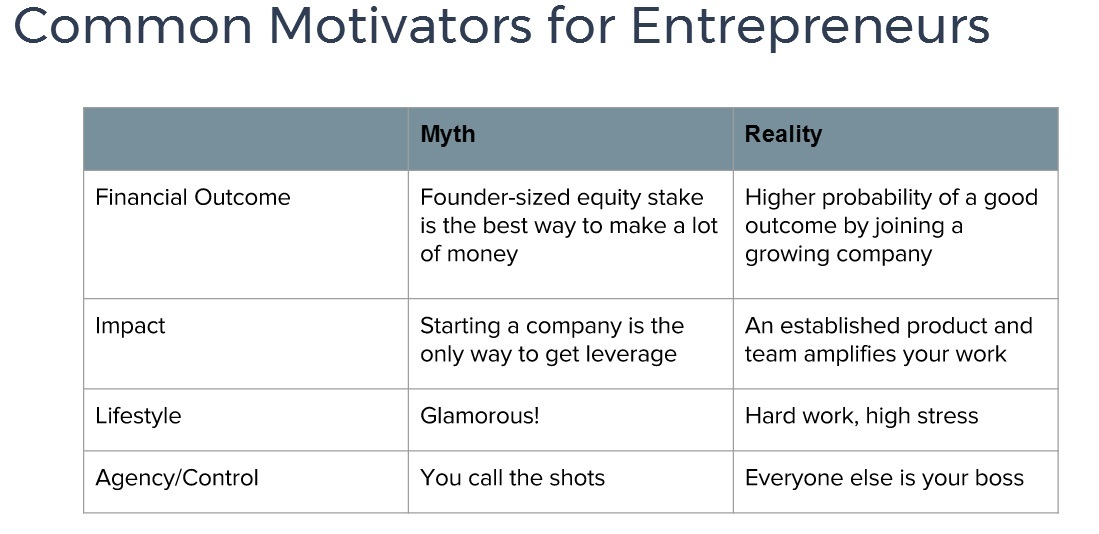
Also, the reality of entrepreneurship usually does not coincide with what you see in the media. If you are aiming at a home run, you must be prepared to spend many years trying and training you may need to become a professional athlete, and still fail.
Now that I have provided you with some bad news, let's talk about what I consider to be the best reason for creating a company. Obviously, you cannot fail to do this for two reasons.
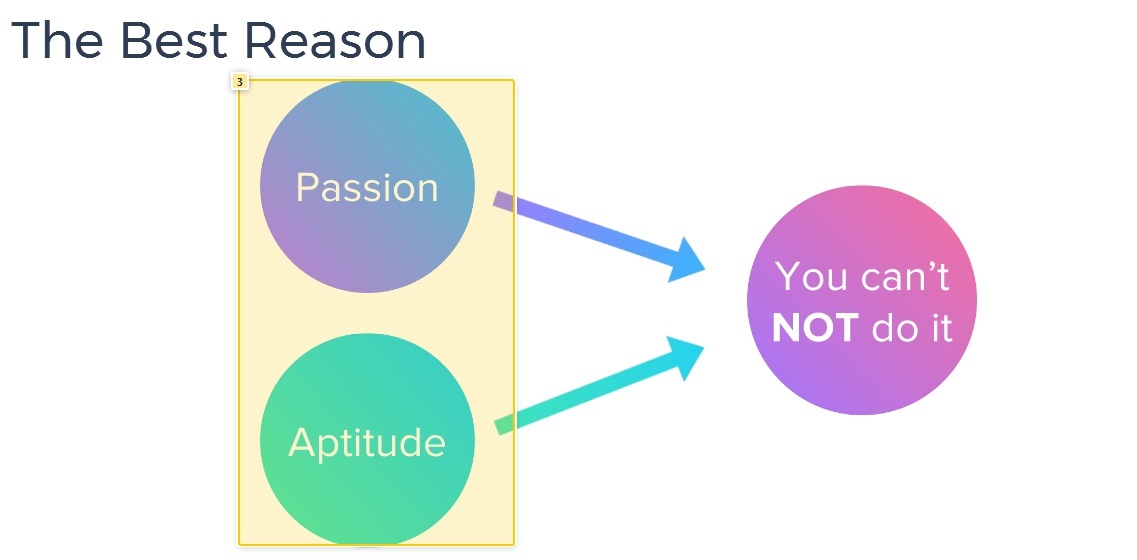
The first is passion.
Passion is very important, since we are talking about how difficult it is to create a company. You will need this passion for your favorite cause in order to break through. And you also need to recruit the wonderful people who will follow you as the leader.
And the second reason is that you are the same person who can bring all this to life by creating a company. If you fail to do this, you will in fact deprive the world of something gorgeous. This suggests that the idea itself is very valuable and so are you the person who can best implement it. If you are not the person, then this person is somewhere there and he is probably trying to beat you and create something even more valuable. The only trick here is that maybe you are the best person for this business, but you have to do it in the context of an existing company. I often feel this way when they describe something to me that sounds like a new feature of an existing product. So if you want to add something new to photo sharing, I strongly recommend viewing Instagram or Snapchat and help them add it to their products.
You can do business in the context of an existing company. I myself decided to become an entrepreneur twice, and both times I was motivated by this very reason. In the case of Facebook, we actually remained Harvard students until the site began to collect more than 100,000 active users per month. We had cognitive dissonance for a very long period of time when we were students and we had this small project. But, in the end, we left, because we could not bear the very thought of not implementing this project fully. At some point, Justin and I were forced entrepreneurs, but we thought the problem we were working on was very important. And that other people working on it were going to develop step-by-step solutions, so a very valuable project was at stake. We could not stop working on it.
In the end, we decided to leave Facebook and get involved in the project in full. Therefore, when I meet businessmen who are focused on success, this is usually the reason I hear from them. They create a company because they have a feeling that this is the only thing they can do now. That's all, briefly and clearly, we now have time for questions. I don't know when my speaking time ends.
- A couple of minutes
- A few minutes, great. If you have questions, raise your hands and repeat the question into the microphone. Someone must always start, a kind of observation.

- I have a question.
- How do you decide that it is better to advise people - to create your own company or stick to an existing one? This is easy on the example of photographs, but in the real world basically everything is not so rosy. So in what framework do you think?
- There are two things. One is a kind of feature that is not the hallmark of a company like the one Mark and Tristan talked about. I do not know how to voice it more specifically, but I sort of think about the idea itself. I see it as a separate product and decide if someone would subscribe to something like this, can this idea have its own monetization model? Will people invest money in learning this new system or is it more perceived as an addition to an existing model? And something so close to it that is worth thinking about is a competitive environment. If you need to present a completely new photo-sharing application, then you need to compete with existing applications in distribution and network effects, which is a huge obstacle to your journey. There are also other metaphors and other products.Clear?
- Yes.
- This is part of a product look.
- Give it to you, and then you.
- I am curious about what you think about the problems of creating a company in the old days and about the problems of creating a company today for the first time?
“I sort of summarized them when I talked about the funnel.” Oh, sorry, the question was, what are the differences in the problems during the creation of the company, for example, in 2004 and the creation of the company today or for the second time in 2009. I sort of outlined them when I talked about the funnel. But I definitely think that, compared to other types of businesses, this one is much more competitive. Most of the valuable markets already have interesting players. Also highly competitive in recruitment markets. It is very hard to get a fairly large team of quite talented people and these people will cost more. This is one of the areas in which prices jumped, and there are a number of others, including real estate, which is very expensive today. Some prices have fallen, for example, at data processing centers, but, in general,prices are higher and therefore more difficult to break through.
- I mentioned a comparison between a startup, being a founder and being myself. How is the position or perhaps the first attempt of people of this kind affected?
- There is a lot more in this range. Excuse me, the question is, what is the difference between the case when you are a kind of late employee in an existing company and the case when you are an early employee? The question is the same, right? I think of this as the range of the risk scale between the creator of the company and its thousandth employee. If you are in the top ten, you have a little more information, you know who founded this company, you know the leaders. You can meet someone from investors. We hope that they have already passed the first turn of the funnel or turn A, but often you still do not have data on income or monetization. And perhaps the product has not yet been evaluated. This is a kind of long range and the sooner you come, the lower your salary will be, the lower the probability of getting a positive return.But you also have the opportunity to get a very big result, because you may have 50 core cases or 100 core cases if you are one of the first employees. Clear?
- Is the probability of success between the employee and one of the founders about the same?
- It's on the range again, right? The question was whether the probability of success was about the same? For the second employee, yes, for the tenth employee there is no, they have much more information. For 20 employees even more information and this will be a continuous range.
- The question is here.
- How did you find your main team when you founded Facebook? Did it happen naturally or did you choose the best in each area?
- Of course, how did we find the main team? On Facebook, in a rather natural way, many people were like people from our network at Harvard, which we moved to the west of Palo Alto. Even at an early stage, we hired Mark Collier and he started recruiting and helped us get into Stanford networks and many of the people we hired just finished university at that time. And we first were very focused on the product team. Much depended on the path and natural work networks. Now everything is a little different, in a small company you cannot work with a contractor, employers, or even some services that help to connect with people. And I think it is very good. Next question.
- I was thinking about measuring enthusiasm. What do you think about the stages from interest to pathological obsession?
- The question is this: when I spoke about passion, did I speak only about interest in the subject or about pathological obsession? This is again the range, but in relation to the pathological obsession. For example, when I say “you can’t do this”, you sometimes look back 20 years later and you are such “I really had to grab onto this idea, it was very important for me”. What about interest, a lot of things interest me in the world, but not all of this is necessarily important and not everyone will attract my attention for 10 or 20 years.
- What is there in time?
- One more question.
- I am not building a product or an idea, should I always have a co-founder, and if so, how should I look for it?
- The question is whether you should always have a co-founder, and if so, how to search for it? This is a rather complicated question. I was convinced that the co-founders are incredibly important. Again, because it is very difficult and you have a friend on whom you can rely and he is with you in the same boat. But if you do not have a certain person with whom you want to work, I cannot give good advice on what to do in both cases. We create a company together, we discuss it together all the time. This whole topic with so-called “dates” with the founders for me is meaningless. I think the creation of a company is a more important relationship than marriage or something like that, because financial issues arise between you more often. And parting is very bad. I highly recommend working with someonewhom you have known for a long time and to discuss as much details as possible, to be sure that you understand each other, because later on these conversations will become much harder. OK, finish?
- Thank you, Dustin. It was great.

Translation: Diana Sheremyeva
To be continued
Who is ready to help with the translation of the following lectures or the improvement of an existing translation - write in a personal.
Full video: UPD Here are the colleagues from the studio GaleonRec voiced:

Source: https://habr.com/ru/post/325806/
All Articles